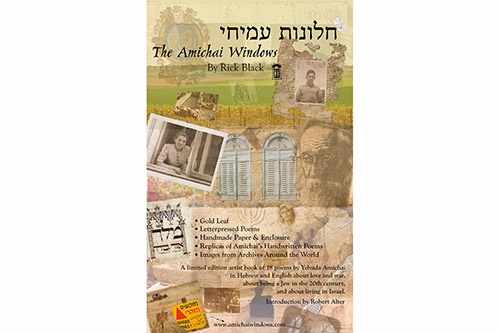



Within a garden I once heard
A song or an old blessing.
And above the dark trees
an eternal window is always lit
in memory of the faces that were in it,
themselves a memory of another lit window.
The six-line poem, “Halon Tamid,” by Yehuda Amichai, one of Israel’s most acclaimed poets, became the inspiration for Bergenfield native Rick Black to embark on a painstaking 10-year project to turn 18 of the poet’s works into an artist book, “The Amichai Windows.”
Amichai, whose work often reflected the tumultuous 20th century in which he lived, his faith in humanity and his personal connection to God, Israel and Judaism, deeply resonated with Black, himself an award-winning writer, poet and book artist, who connected with Amichai’s words about family, love and war.
In a March 7 program on Zoom presented by Rutgers University’s Allen and Joan Bildner Center for the Study of Jewish Life, Black spoke of his own interactions and connection with the beloved poet, who was born in Germany in 1924, immigrated with his family as a 12-year-old to pre-state Israel and died in 2000.
Corresponding to the Hebrew “chai,” for life, only 18 of the sculptural design books have been made and are housed at such venerable institutions as the United States Holocaust Memorial Museum and the Library of Congress. Each poem is wrapped and folded in handmade paper presented in an enclosure resembling a Jerusalem window. Included in each are replicas of Amichai’s original handwritten poems, images of collaged Jewish history and life meticulously researched by Black from international archives.
Amichai’s original manuscripts and papers are housed at Yale University’s Beinecke Rare Book and Manuscript Library, which also has one of the 18 books.
In a conversation with Gary A. Rendsburg, Distinguished Professor of Jewish Studies and the Blanche and Irving Laurie Chair in Jewish History, Black touched on his own ties to Israel, Rutgers, the craft of creating artist books and how Amichai inspired him to undertake the ambitious project.
Rendsburg and another Rutgers professor of Jewish studies, Azzan Yadin-Israel, a native Hebrew speaker familiar with slang, met with Black over the course of a year at a Highland Park cafe to discuss, edit and tweak the nuances of translating poetry from Hebrew to English.
“I was always looking for the more literal capture of the Hebrew into English, while Azzan allowed for greater freedom in the translation process,” said Rendsburg, who had a copy of the book spread open behind him. “ In the end, I suspect that we found a good balance between the two approaches. He said he tried to come up with “schematic ideas” for each poem, crafting his own metaphor for them using Amichai’s words.
Black is the founder of Turtle Light Press, which publishes artist books, fine art prints, note cards, digital photography and haiku books. He came to know Israel during a six-year period living there, first studying Hebrew literature at the Hebrew
University and then as a correspondent for the Associated Press and New York Times for three years during the first Intifada and Persian Gulf War.
Black first met Amichai after returning to America while working as press liaison at the Israeli consulate in Philadelphia.
Invited to speak at a conference for young Jews, Black had gone to meet him and his wife, Hana, at the train station there. Noticing that the poet was lugging a huge bag up the stairs, Black ran down to offer assistance, but Amichai waved him off, telling him in Hebrew, “Everybody has to shlep their own bags.”
“He hits me right away with a metaphor,” said Black, who was to discover both he and Amichai found poetry a way to express their pain and feelings. “It was like that the whole weekend. He was very approachable, very warm. We hit it off right away.”
Black is still in touch with Hana, who gave her blessing for the book.
To Black the six-line “Halon Tamid” seemed to have one memory tucked inside another using humorous, but ambiguous, questioning of whether the light source is the ner tamid, or from the windows of memories of loved ones. The idea of using windows as a theme worked metaphorically and symbolically since people can see a different scene each time they look out a window, just as a poem can be interpreted differently in different readings.
Black said once the pandemic ends he hopes to have exhibits and speaking engagements about the book. He also hopes to do a “popular” book edition that can be purchased.
For more information about the book, Amichai and Black, go to www.amichaiwindows.com.










